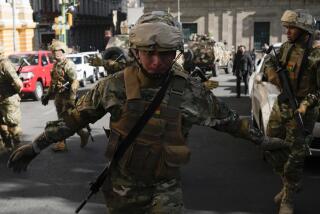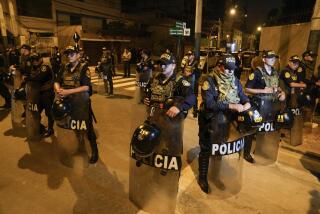Peru Rebels, Alleging Attack Plan, Halt Talks
BUENOS AIRES — Accusing the Peruvian government of planning a subterranean attack, the leftist rebels who are holding 72 hostages in Lima halted talks with the government Thursday, saying they suspect that security forces are digging a tunnel beneath the besieged Japanese ambassador’s residence.
Nestor Cerpa Cartolini, the rebel leader, told reporters by two-way radio that the guerrillas have heard loud noises growing under the mansion in the past three days.
The guerrillas believe that police are digging a tunnel through which they would launch a raid, Cerpa said. He said the rebels will not attend today’s scheduled talks, which would have been the ninth round of negotiations in the weeks-long standoff.
“We are taking protective measures,” Cerpa said. “We are ready to confront whatever situation arises. Tomorrow we will not attend the conversations, because we do not think it is correct that on the one hand there is talk of dialogue and conversations and on the other there are these kinds of maneuvers.”
The Peruvian defense minister dismissed the rebels’ accusation in statements to television reporters in Bolivia, where he was meeting with officials to discuss joint anti-terrorist efforts.
Cerpa’s accusation “is a product of the nervousness of the Tupac Amaru and nothing more,” Defense Minister Tomas Castillo Meza said. Asked about the possibility that the Peruvian security forces might storm the mansion, Castillo said: “President Fujimori has been clear. The solution will be peaceful.”
In response to the development, President Alberto Fujimori cut short a trip to Cuzco and hurried back to Lima.
The verbal offensive Thursday by the Tupac Amaru Revolutionary Movement injected new tension into the crisis and dampened recent hopes of a breakthrough.
Whether Cerpa spoke out of genuine alarm or merely to strengthen his negotiating position, his announced withdrawal raised fears of a breakdown in the talks.
Cerpa told reporters that the hostages had also heard noises under the floor. He invited mediators to enter the residence to listen for themselves.
Three mediators--Bishop Juan Luis Cipriani, Ambassador Anthony Vincent of Canada and Michel Minnig, chief of the International Committee of the Red Cross here--visited the barricaded mansion and left without comment.
There had been rumblings that police or military commandos might use a tunnel as part of an anti-terrorist attack.
In January, security forces explored the feasibility of digging a tunnel or using existing sewer passages to sneak into the mansion, a source close to law enforcement said. And Peruvian radio reported Thursday that, despite a heavy security cordon, police have let work crews keep removing truckloads of dirt and debris from a house under construction near the besieged residence.
The armed forces and intelligence service wield great power in Peru and have reportedly lobbied the president to use force to end the hostage siege.
Just a day earlier, optimism accompanied the most substantive round of negotiations to date. On Wednesday, the government offered the rebels a reported deal: safe passage out of the country, political asylum in Cuba and immunity from prosecution. That offer grew out of a meeting between Fujimori and Cuban leader Fidel Castro.
But Cerpa promptly criticized the Cuba trip, saying it diverted real discussion of the guerrillas’ demand for the freedom of 380 or so of their imprisoned colleagues.
An estimated 18 Tupac Amaru guerrillas took over the residence Dec. 17. They have reportedly rigged it with explosives.
More to Read
Sign up for Essential California
The most important California stories and recommendations in your inbox every morning.
You may occasionally receive promotional content from the Los Angeles Times.










